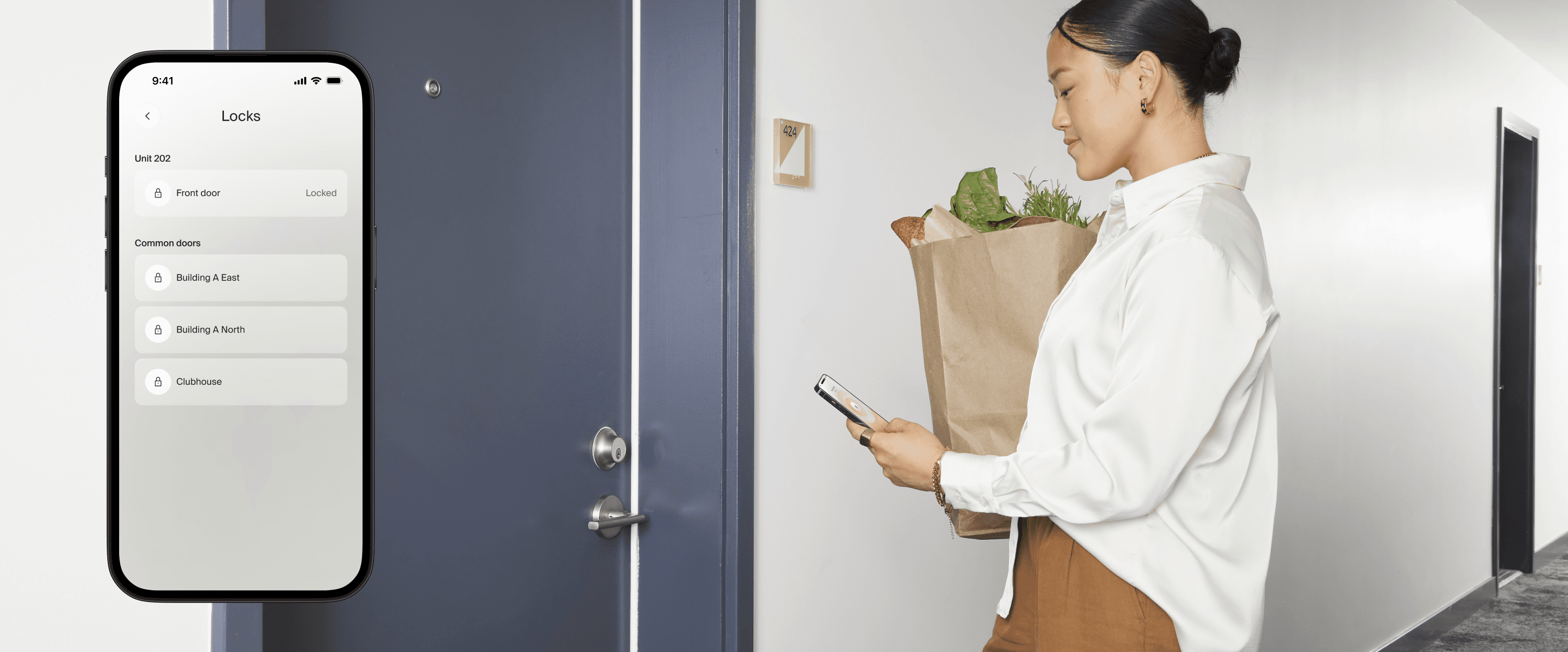November 19, 2024
The Hidden Risks of Proprietary Smart Locks

Key takeaways
- The locks you choose will have a long-term impact on your ability to enable vendor flexibility, meet resident expectations, and scale operational efficiency.
- Proprietary locks that haven’t been independently certified by a third party could create avoidable capital expenditures and leave you with hardware that doesn’t meet durability, reliability, and security standards.
Smart locks are arguably the most important device in a smart apartment platform — a critical bridge between secure access, operational efficiency, and resident satisfaction. But choosing the right lock isn’t just a matter of finding the lowest-cost solution. The locks you install today will have a long-lasting impact on your ability to scale operations, meet resident expectations, and adapt to future needs.
While some smart tech providers have ventured into building their own proprietary smart locks, these “in-house” solutions come with hidden pitfalls.
Before committing to a provider’s proprietary smart locks, consider the risks you could be taking on:
Risk 1: You’re locked in to one vendor
Problem:
When you choose proprietary locks, you’re creating an unnecessary dependency on a single vendor.
- Proprietary locks don’t integrate seamlessly with other platforms, meaning you can’t “mix and match” across providers.
- If the provider’s service no longer meets your needs or if a better option emerges, you’re stuck with hardware that you can’t repurpose with a different provider.
Impact:
Switching vendors will require you to rip and replace the locks, leading to:
- Avoidable capital expenditures
- A massive logistical challenge
- Disruption to existing community
- Diminished operational efficiency
Risk 2: Locks may not be reliable, durable, or secure
Problem:
Designing and manufacturing smart locks that meet rigorous reliability, durability, and security standards requires specialized expertise.
- Established hardware manufacturers have spent decades refining their processes to ensure locks can withstand years of real-world use, environmental stress, and security threats.
- Newer smart tech companies may lack this expertise, as they focus on software and haven’t fully mastered the complexities of building durable hardware.
Think of it like this: You wouldn’t ask an architect to lay the foundation of a building. While they may understand the design, they lack the hands-on expertise to ensure the foundation holds up over time.
Impact:
Defects, failures, and security vulnerabilities in hardware due to manufacturing limitations can cause widespread deployment issues and frustrate residents.
Resident dissatisfaction with unreliable hardware often translates to:
- Increased resident complaints
- Reduced staff efficiency
Risk 3: Limited operational efficiency gains and poor resident experience
Problem:
Proprietary locks made by smart tech providers are often limited in their connectivity capabilities, and may not enable real-time, remote access control. For example, a lot of proprietary locks aren’t actually connected, only supporting Bluetooth or fob-based access.
Without connected locks:
- Staff can’t manage access offsite, automate access credentialing at unit turns, or retain a record of access events across common spaces
- Prospects have to find and pick up fob(s) to access model units and amenities during self-guided tours
- Residents can’t check their lock status and grant access to trusted service providers like dog walkers from anywhere
Impact:
If you purchase a provider’s proprietary offline locks, you might not see the full return on your investment.
- Staff will trade time spent managing keys with time managing fobs and credentials
- Staff will have to manually check vacant unit locks
- Resident satisfaction and retention will suffer as a clunky access experience causes frustration.
Choosing the right smart locks: key criteria to look for
Given the risks of proprietary hardware, here’s what to look for in smart locks to get the most out of your investment:
Robust third-party certification
Manufacturers that certify their own locks create an inherent conflict of interest.
Choose locks that have undergone a rigorous, independent certification process to ensure reliability, durability, and security. Certifications against standards for battery life, connectivity reliability, and compatibility confirm the hardware is built to last. Ask a prospective provider about their certification process before you purchase hardware.
Cross-platform compatibility
Opt for smart locks that work seamlessly with multiple smart apartment platforms. This flexibility lets you switch providers if needed without replacing all the hardware, saving you significant capital expenditures and preventing operational disruptions.
Remote access management
Ensure the locks offer robust remote management capabilities. Staff should be able to manage vacant unit access remotely and easily handle credentialing at unit turnovers. Residents should have full control, with the ability to monitor and manage access from any location.
Insights from the field
Explore work and research reflecting over a decade worth of experience and leadership in the multifamily space.


























